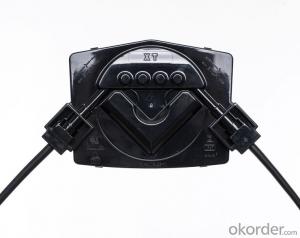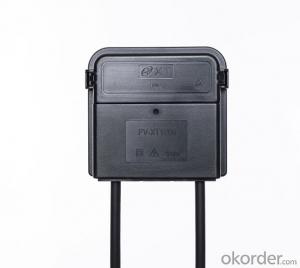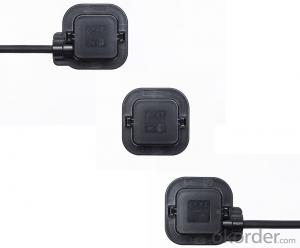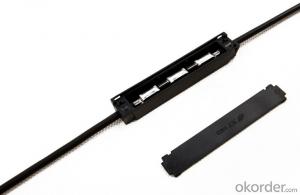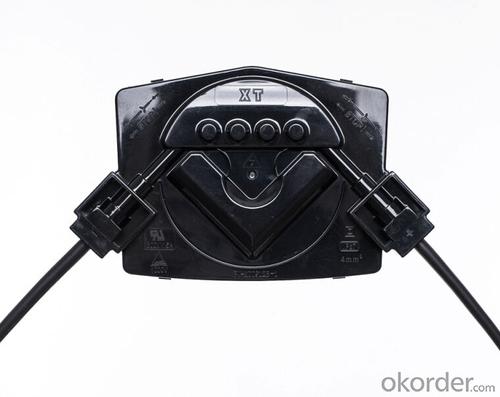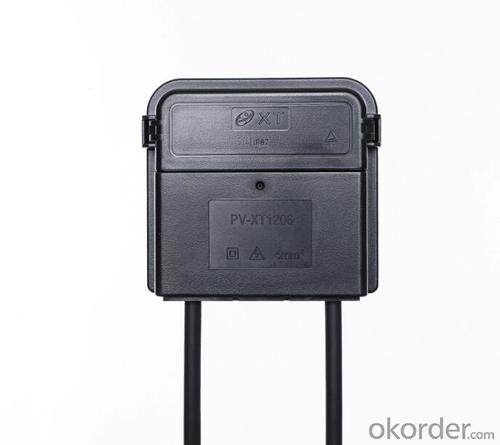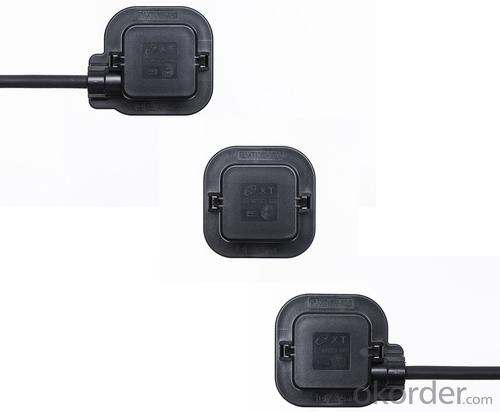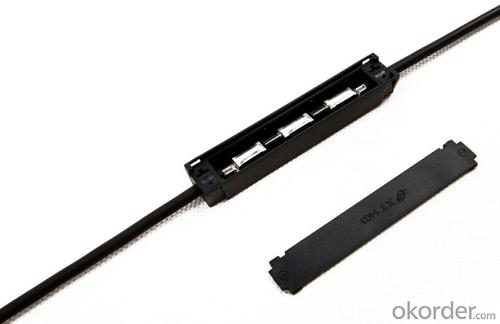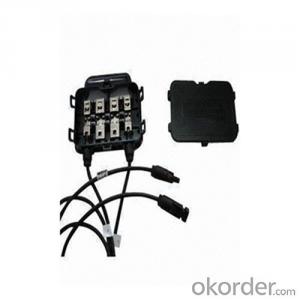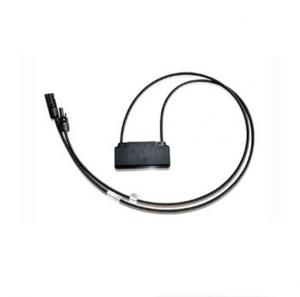Sunspot Solar Energy Systems PV Junction Box PV-0912 TÜV, UL, ISO9001 Certified
- Loading Port:
- Guangzhou
- Payment Terms:
- TT OR LC
- Min Order Qty:
- 3000 pc
- Supply Capability:
- 3000000 pc/month
OKorder Service Pledge
OKorder Financial Service
You Might Also Like
Feature
a. copper design, good heat output
b. round sealing, good waterproof
c. cover replacement, easy maintenance
d. non-glue and ultra-thin
e. double-sided contact, low contact resistance
Item Data Terminals for Ribbons 4 Rated Current 8A/12A Rated Voltage 1000V Dimension 132*98.9*18.4mm Temperature -40℃~+85℃ Size of Cables 4m㎡/12AWG Size of Ribbons W(6mm)*T(0.2mm) Protection Degree IP67 Flammability Class V-0
Product description
1. All the connection made by double fixed connection low power loss
2. With the capacity of anti-aging and resistance to ultraviolet radiation on the outer cover with excellent box design with good thermal dissipation
3. Demonstrating safe, realiable and excellent lasting functionality, applicable in harsh outdoors working ambient
4. Big variety for choices,1 rail ,2 rail,3 rail,4 rail,5 rail,6 rail.mini junction box and solar junction box for solar street light
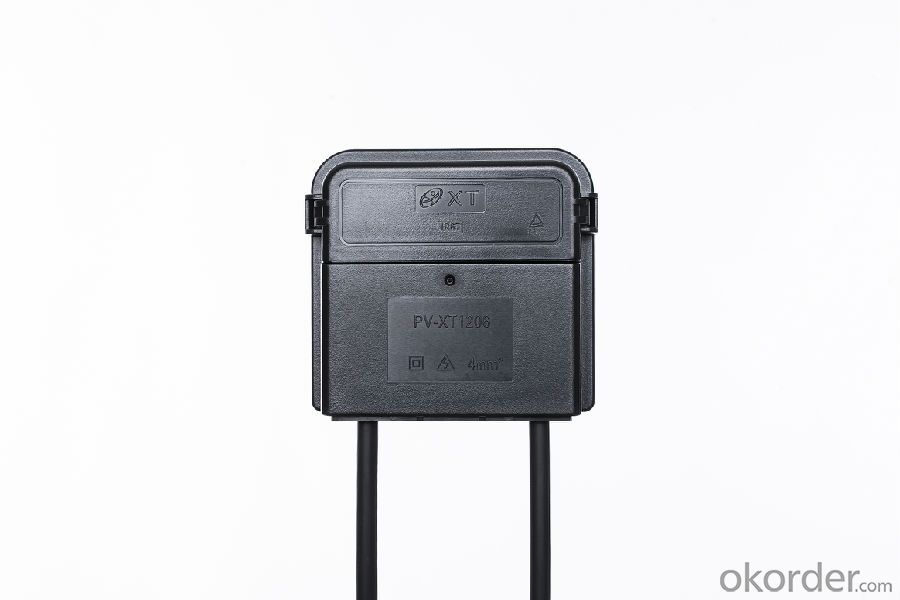
FAQ
1. How long will my inquiry get response?
Your inquiry related to our products or prices will be replied within 24 hours.
2. Can I get professional service and suggestion?
Well-trained and experienced staffs to answer all your questions in fluent English.
3. Do you accept OEM or customized design?
OEM & ODM, any your customized lightings we can help you to design and put into product.
4. What if I need specific design?
Distributorship are offered for your unique design and some our current models.
- Q: Can solar energy systems be used for powering electric vehicle solar charging canopies?
- Yes, solar energy systems can be used to power electric vehicle solar charging canopies. Solar panels installed on the canopies can generate electricity from the sun, which can then be used to charge electric vehicles. This sustainable approach reduces reliance on traditional power sources and helps promote clean energy solutions.
- Q: Can solar energy systems be installed on military bases or installations?
- Yes, solar energy systems can be installed on military bases or installations. In fact, many military bases have already started incorporating solar power as a part of their energy mix. Solar energy offers numerous benefits to military installations, including energy independence, cost savings, reduced reliance on fossil fuels, and enhanced national security. Additionally, solar installations can also serve as a backup power source during emergencies or power outages, further strengthening the resilience of military bases.
- Q: How do solar energy systems impact the stability of the electrical grid?
- The stability of the electrical grid can be influenced in both positive and negative ways by solar energy systems. On the one hand, these systems aid in diversifying the energy mix by providing an environmentally friendly and renewable source of electricity. This reduces reliance on fossil fuels and lessens greenhouse gas emissions, thereby promoting a more sustainable grid. Furthermore, solar energy systems can enhance grid stability by decreasing the demand for electricity during daylight hours. When the sun is shining, solar panels generate electricity at their maximum capacity, which can offset the need for fossil fuel power plants to operate at peak levels. This helps alleviate strain on the grid during periods of high demand, ultimately preventing potential power outages or blackouts. Nonetheless, solar energy systems also present challenges to the stability of the electrical grid. The intermittency of solar power generation, for instance, poses a significant obstacle. Since solar power relies on weather conditions, it fluctuates throughout the day. This fluctuation can create imbalances between electricity supply and demand, potentially destabilizing the grid. To address this issue, grid operators must effectively manage the integration of solar energy systems into the grid by implementing advanced forecasting and grid management technologies. Moreover, in certain regions with a high penetration of solar energy systems, there can be an excess of electricity during peak solar production hours. This surplus energy may not be efficiently utilized or stored, leading to voltage fluctuations and grid instability. Grid operators must invest in energy storage technologies, such as batteries, to store excess solar power and release it when needed, ensuring grid stability. In conclusion, solar energy systems exert a significant influence on the stability of the electrical grid. While they contribute to a cleaner and more sustainable energy mix, their intermittent nature and potential for over-generation necessitate careful grid management and the integration of energy storage technologies. With proper planning and investment, solar energy systems can play a vital role in achieving a stable and resilient electrical grid.
- Q: How do solar energy systems impact energy independence in rural areas?
- Solar energy systems have a significant positive impact on energy independence in rural areas. By harnessing the power of the sun, these systems provide a reliable and sustainable source of electricity, reducing reliance on fossil fuels and centralized power grids. This empowers rural communities to generate their own energy, reducing dependence on external suppliers and increasing self-sufficiency. Additionally, solar energy systems can be easily installed and maintained, making them accessible and affordable for rural households, thus further boosting their energy independence.
- Q: Can a solar energy system be installed on a shopping center or mall?
- Certainly, a shopping center or mall can have a solar energy system installed. In fact, numerous shopping centers and malls worldwide are currently adopting solar panels to produce electricity. The ample rooftop spaces found in these establishments make them an ideal choice for solar installations. By harnessing the sun's power, shopping centers and malls can greatly diminish their reliance on conventional energy sources, decrease their carbon footprint, and lower their energy expenses. Additionally, solar energy systems can also be integrated into parking lots or carports, offering shade for vehicles while simultaneously generating clean energy. All in all, the installation of a solar energy system on a shopping center or mall presents a viable and sustainable solution for fulfilling their energy requirements.
- Q: Can solar energy systems be used in powering street cameras or surveillance systems?
- Yes, solar energy systems can indeed be used to power street cameras or surveillance systems. Solar panels can be installed on rooftops or poles near the surveillance systems, capturing sunlight and converting it into electricity. This renewable energy source can provide a reliable and sustainable power supply, ensuring continuous operation of the cameras and surveillance systems even in remote areas without access to the electrical grid. Additionally, solar energy systems eliminate the need for costly and environmentally harmful fossil fuels, making them an environmentally friendly choice for powering street cameras and surveillance systems.
- Q: How do solar energy systems affect the insurance premiums of a property?
- Solar energy systems can have a positive impact on insurance premiums for a property. By installing solar panels, the property becomes more environmentally friendly and less dependent on traditional energy sources, reducing the risk of damage or loss associated with power outages or utility failures. This can lead to lower insurance premiums as insurers recognize the decreased risk. Additionally, some insurance companies offer specialized policies or discounts specifically for properties with solar energy systems, further reducing premiums.
- Q: Can solar energy systems be used for powering electric vehicle solar charging roads?
- Yes, solar energy systems can be used to power electric vehicle solar charging roads. Solar panels can be installed alongside or on top of the roads, converting sunlight into electricity. This electricity can then be used to power electric vehicle charging stations located along the roads, allowing vehicles to charge their batteries while driving. This innovative technology can help reduce dependence on fossil fuels and promote sustainable transportation options.
- Q: Can solar energy systems be used in areas with limited roof access for maintenance?
- Solar energy systems can indeed be utilized in areas where roof access for maintenance is limited. Although the usual practice is to install solar panels on rooftops for maximum exposure to sunlight, there are alternative choices to consider. One option is to install ground-mounted solar panels in areas where roof access is restricted, making maintenance and cleaning tasks simpler. Furthermore, solar panel systems can be integrated into other structures like carports or pergolas, offering an alternative approach to the conventional rooftop installations. These alternatives guarantee the effective utilization of solar energy systems in areas with limited roof access for maintenance.
- Q: Can solar energy systems be used for powering telecommunications infrastructure?
- Yes, solar energy systems can be used to power telecommunications infrastructure. Solar panels can be installed on rooftops or in open spaces to harness sunlight and convert it into electricity. This renewable energy can then be used to power communication towers, equipment, and other telecommunications infrastructure, providing a sustainable and reliable energy source. Additionally, solar energy systems can be combined with battery storage solutions to ensure uninterrupted power supply even during periods of low sunlight or at night.
Send your message to us
Sunspot Solar Energy Systems PV Junction Box PV-0912 TÜV, UL, ISO9001 Certified
- Loading Port:
- Guangzhou
- Payment Terms:
- TT OR LC
- Min Order Qty:
- 3000 pc
- Supply Capability:
- 3000000 pc/month
OKorder Service Pledge
OKorder Financial Service
Similar products
Hot products
Hot Searches
Related keywords
